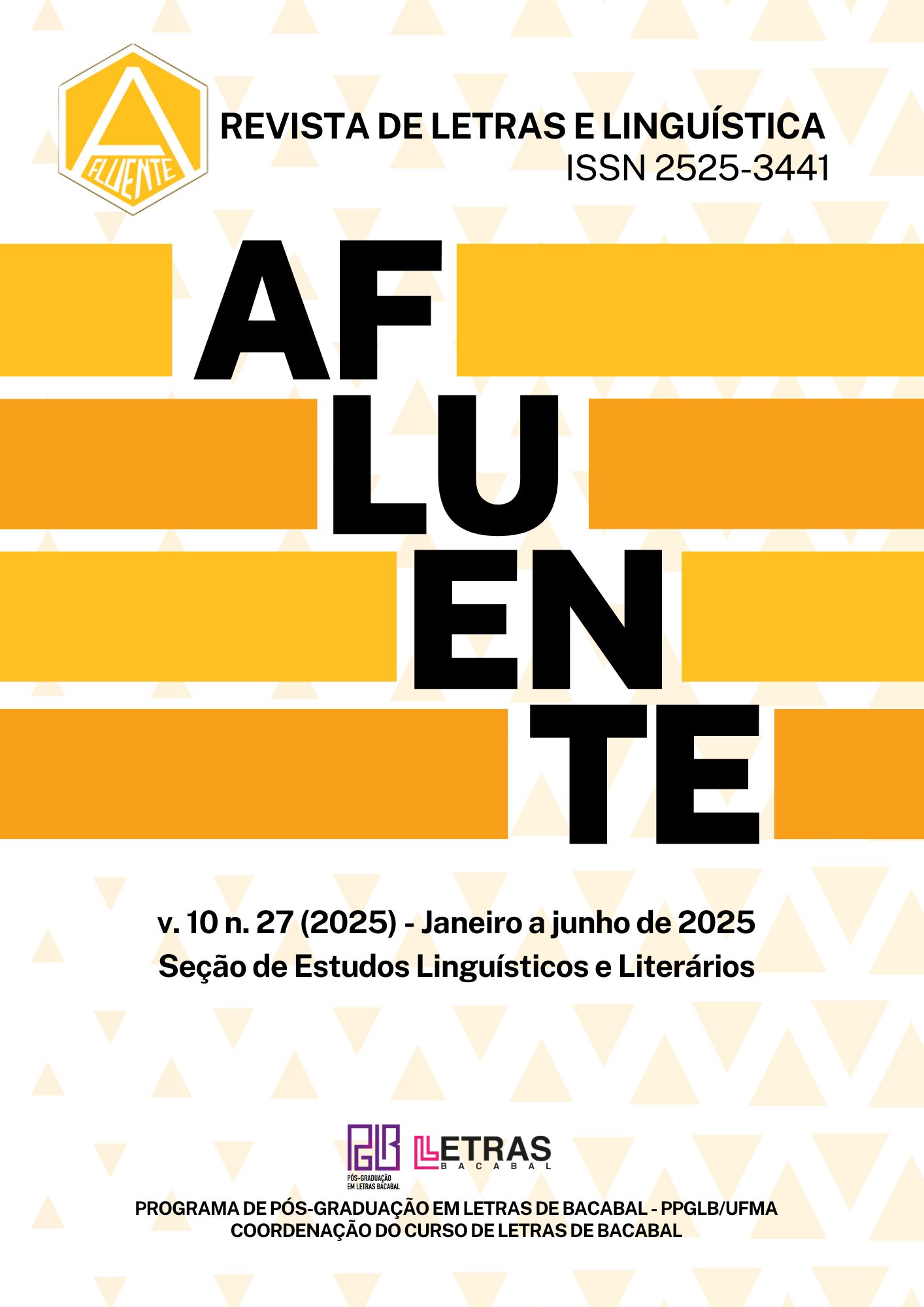Rhetorical organization of UNILAB'S master's abstracts
a look from ABNT NBR 6028
DOI:
https://doi.org/10.18764/2525-3441v10n27.2025.07Keywords:
Abstract genre, Rhetorical moves, ABNT NBR 6028Abstract
This work aims to reveal the rhetorical movements present in summaries of the Graduate courses offered by the University of International Integration of Afro-Brazilian Lusophony – UNILAB that did not follow the minimum or maximum of words proposed by NBR 6028:2021 (which is 150 and 500 words, respectively). In view of this, in this article, we will refer to the standardization guidelines of UNILAB, as well as to the Brazilian Association of Technical Standards (ABNT) itself, especially NBR 6028, which establishes the requirements for writing and presenting abstracts, and to the researchers who contributed to the definition, study and structuring of abstracts, namely: John Swales (2012), Rodrigues (1998), Santos (1995), Motta-Roth and Hendges (2010), and, Ramos (2011), from whom we will also use his model of rhetorical organization, as well as based on Swales (1990, 2004, 2012), author who is a reference in any and all work that involves the analysis of genres in the sociorhetorical approach. Our corpus consists of 13 papers with less than 150 words in the writing of the abstract and 20 abstracts with more than 500 words, that is, 33 abstracts, therefore, we will use a quantitative-qualitative methodology. The results reveal that abstracts with less than 150 words do not present all rhetorical movements, while those with more than 500 words, the rhetorical movements of the Ramos (2011) model appear in greater quantity. Therefore, although the abstracts did not meet the minimum proposed by NBR 6028:2021 (which is 150 words), they followed UNILAB's standardization guidelines.
Downloads
References
ASSOCIAÇÃO BRASILEIRA DE NORMAS TÉCNICAS. NBR 6028: Informação e documentação — Resumo, resenha e recensão — Apresentação. Rio de Janeiro: ABNT, 2021.
ASKEHAVE, Inger; SWALES, John Malcom. Identificação de gênero e propósito comunicativo: um problema e uma possível solução. In:_ BEZERRA, Benedito Gomes; BIASI-RODRIGUES, Bernadete; CAVALCANTE, Mônica Magalhães (Org.). Gêneros e sequências textuais. Recife: Edupe, 2009, p. 221-247.
BAWARSHI, Anis S; REIFF, Mary Jo. Gênero: história, teoria, pesquisa, ensino. Tradução: Benedito Gomes Bezerra. 1ª ed. São Paulo. Parábola, 2013.
BEZERRA, Benedito Gomes. O gênero como ele é (e como não é). In:._ Gênero, propósito comunicativo e comunidade discursiva. 1ª ed. São Paulo. Parábola, 2022, p. 77 - 99.
BIASI-RODRIGUES, Bernadete. O gênero resumo: uma prática discursiva da comunidade acadêmica. In:_ In: _ BIASI-RODRIGUES, Bernadete; ARAÚJO, Júlio César; SOUSA, Socorro Cláudia Tavares de (Org.). Gêneros textuais e comunidades discursivas: um diálogo com John Swales. Belo Horizonte: Autêntica Editora, 2009, p. 49-75.
CAVALCANTE, Mônica Magalhães. Os sentidos do texto. 1. ed - São Paulo: Contexto, 2018.
DIAS, Fernanda Goulart Ritti; BEZERRA, Benedito Gomes. Análise retórica de introduções de artigos científicos da área da saúde pública. Horizontes de Linguística Aplicada, 2013, p. 163-180.
FREITAS, Tatiane Lima De. Uma análise comparativa entre áreas disciplinares da grande área de Ciências Humanas: semelhanças e diferenças sociorretóricas em artigos acadêmicos. 2023. 299 f. Tese (Doutorado em 2023) - Universidade Estadual do Ceará, Fortaleza, 2023.
MOTTA-ROTH; Désirée; HENDGES, Gabriela Rabuske. Produção textual na universidade. São Paulo: Parábola Editorial, 2010, p. 151-162.
RAMOS, Wiliam César. Um roteiro para a escrita de abstracts de artigos de pesquisa: estrutura retórica e técnicas de argumentação. Tese (Doutorado em Linguística e Língua Portuguesa) – Universidade Estadual Paulista, Faculdade de Ciências e Letras, 2011
RODRIGUES, Bernardete Biasi. Estratégias de condução de informações em resumos de dissertações. 1998. 307f. Tese (Doutorado) - Universidade Federal de Santa Catarina, Pós-Graduação em Letras/Linguística, Florianópolis (SC), 1998.
SILVA, Iraci Nobre da. Análise de movimentos retóricos em introduções de artigos científicos de graduando de diferentes áreas disciplinares. In: Anais do simpósio internacional de estudos de gêneros textuais, 2017. Anais eletrônicos. Campinas, Galoá, 2017. Disponível em: <https://proceedings.science/siget/trabalhos/analise-de-movimentos-retoricos-em-introducoes-de-artigos-cientificos-de-graduan?lang=pt-br> Acesso em: 10 jun. 2023.
SWALES, Malcolm John; Research Genres: explorations and applications. New York: Cambridge University Press, 2004.
SWALES, Malcolm John; Repensando gêneros: uma nova abordagem ao conceito de comunidade discursiva. In:_ BEZERRA, Benedito Gomes; BIASI-RODRIGUES, Bernadete; CAVALCANTE, Mônica Magalhães (Org.). Gêneros e sequências textuais. Recife: Edupe, 2009, p. 197-220.
SWALES, Malcolm John; FEAK, Cristine B. Academic Writing for Graduate Students: essential tasks and skill. University Michigan Press, 3ª ed. 2012.
Universidade da Integração Internacional da Lusofonia Afro-Brasileira. Manual de normalização de trabalhos acadêmicos da Unilab. Sistemas de Bibliotecas da Unilab. Acarape, CE. 2020.
Downloads
Published
How to Cite
Issue
Section
License
Copyright (c) 2025 Afluente: Revista de Letras e Linguística

This work is licensed under a Creative Commons Attribution 4.0 International License.
Direitos autorais Afluente: Revista Eletrônica de Letras e Linguística
Este trabalho está licenciado com uma Licença Creative Commons - Atribuição 4.0 Internacional.














